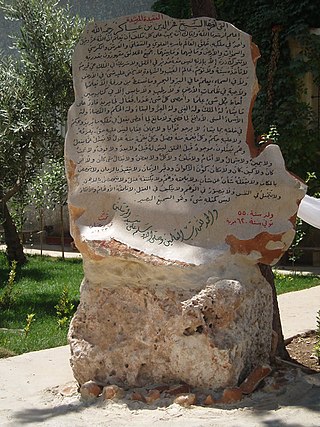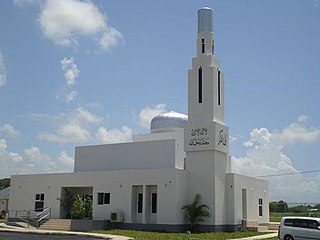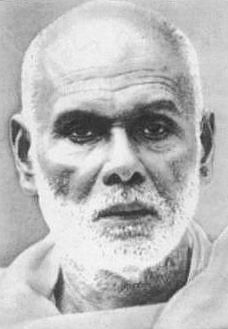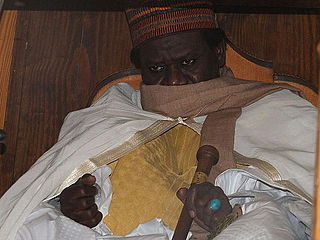Abū Zakariyyā Yaḥyā ibn Sharaf al-Nawawī (Arabic: أبو زكريا يحيى بن شرف النووي;, popularly known as al-Nawawī or Imam Nawawī, was a Sunni Shafi'ite jurist and hadith scholar. Al-Nawawi died at the relatively early age of 45. Despite this, he authored numerous and lengthy works ranging from hadith, to theology, biography, and jurisprudence that are still read to this day.
Nuʿmān ibn Thābit ibn Zūṭā ibn Marzubān, commonly known by his kunyaAbū Ḥanīfa, or reverently as Imam Abū Ḥanīfa by Sunni Muslims, was a Sunni Muslim theologian and jurist who became the eponymous founder of the Hanafi school of Sunni jurisprudence, which has remained the most widely practised school of law in the Sunni tradition. The school of thought predominates in Central Asia, Afghanistan, Iran, Turkey, the Balkans, Russia, Circassia, Pakistan, Bangladesh, Muslims in India, and some parts of the Arab world. He is also widely called al-Imām al-Aʿẓam and Sirāj al-Aʾimma by Sunni Muslims.
Abu Muhammad Abd al-Malik ibn Hisham ibn Ayyub al-Himyari, known simply as Ibn Hisham, was a 9th-century Muslim historian and scholar who is known for editing the biography of Islamic prophet Muhammad written by Ibn Ishaq. He grew up in Basra, in modern-day Iraq and later moved to Egypt.

Mohammed Alexander Russell Webb was an American writer, publisher, and the United States Consul to the Philippines. He converted to Islam in 1889, and is considered by historians to be the earliest prominent Old Stock American Muslim convert. In 1893, he was the sole person representing Islam at the first Parliament of the World's Religions.

Omar ibn Said was a Fula Islamic scholar from Futa Toro in West Africa, who was enslaved and transported to the United States in 1807. There, while enslaved for the remainder of his life, he wrote a series of Arabic-language works on history and theology, including a short autobiography.

Ibrāhīm Niasse (1900–1975)—or French: Ibrahima Niasse, Wolof: Ibrayima Ñas, Arabic: شيخ الإسلام الحاج إبراهيم إبن الحاج عبد الله التجاني الكولخي Shaykh al-'Islām al-Ḥājj Ibrāhīm ibn al-Ḥājj ʿAbd Allāh at-Tijānī al-Kawlakhī —was a Senegalese major leader (wolof) of the Tijānī Sufi order of Islam in West Africa. His followers in the Senegambia region affectionately refer to him in Wolof as Baay, or "father."

Yusuf bin Ismail bin Yusuf bin Ismail bin Muhammad Nâsir al-Dîn an-Nabhani (1849–1932) born in Ijzim in Palestine, was a Palestinian Sunni Islamic scholar, judge, prolific poet, and defender of the Ottoman Caliphate. He died in Beirut.

Bihar al-Anwar is a comprehensive collection of traditions (ahadith) compiled by Shia scholar Mohammad-Baqer Majlesi, known as Allama Majlisi. It is a hadith collection as the secondary source used beside the Four Books. Bihar al-Anwar which a compendium of Daif (weak) Hadiths, completed between 1694 AD and 1698 AD.

The Jalayirid Sultanate was a Mongol Jalayir dynasty which ruled over modern-day Iraq and western Iran after the breakup of the Mongol khanate of Persia in the 1330s. It lasted about fifty years, until disrupted by Timur's conquests and the revolts of the Qara Qoyunlu Turkoman. After Timur's death in 1405, there was a brief attempt to re-establish the sultanate in southern Iraq and Khuzistan. The Jalayirids were finally eliminated by the Qara Qoyunlu in 1432.
The Bilali Muhammad Document is a handwritten, Arabic manuscript on West African Islamic law. It was written in the 19th century by Bilali Mohammet, an enslaved West African held on Sapelo Island of Georgia. The document is held at the Hargrett Rare Book & Manuscript Library at the University of Georgia as part of the Francis Goulding papers. It is referred to as the "Ben Ali (Bilali) Manuscript".

Jamaica is a predominantly Christian country, with Islam being a minority religion. Due to the secular nature of Jamaica's constitution, Muslims are free to proselytize and build places of worship in the country.
Michael Anthony Sells is John Henry Barrows Professor of Islamic History and Literature in the Divinity School and in the Department of Comparative Literature at the University of Chicago. Michael Sells studies and teaches in the areas of Qur'anic studies, Sufism, Arabic and Islamic love poetry, mysticism, and religion and violence.

Mohammad Akram Nadwi is an Islamic scholar and the Dean of Cambridge Islamic College, principal of Al-Salam Institute, and an Honorary Visiting Fellow at the Markfield Institute of Higher Education. He is the author of the 43 volume biographical dictionary called Al-Wafa bi Asma al-Nisa, which chronicles the lives of 10,000 female hadith scholars and narrators.
Ahmad Zarruq also known as Imam az-Zarrūq ash Shadhili was a 15th-century Moroccan Shadhili Sufi, jurist and saint from Fes. He is considered one of the most prominent and accomplished legal, theoretical, and spiritual scholars in Islamic history, and is thought by some to have been the renewer of his time (mujaddid). He was also the first to be given the honorific title "Regulator of the Scholars and Saints". His shrine is located in Misrata, Libya, however unknown militants exhumed the grave and burnt half the mosque.
Bosnian Americans are Americans whose ancestry can be traced to Bosnia and Herzegovina. The vast majority of Bosnian Americans immigrated to the United States during and after the Bosnian War which lasted from 1992–95. Nevertheless, many Bosnians immigrated to the United States as early as the 19th century. The largest Bosnian-American population can be found in both Greater St. Louis and in Greater Chicago which boast the largest number of Bosnians in the world outside Europe.

Tahdhib al-Ahkam is a Hadith collection, by Twelver Shia Hadith scholar Abu Ja'far Muhammad Ibn Hasan Tusi, commonly known as Shaykh Tusi. This work is included among the four books of Shia Islam. It is a commentary on the Al-Muqni'ah by Al-Shaykh Al-Mufid, who was a Twelver Shia theologian.

Vakkom Mohammed Abdul Khader Moulavi, popularly known as Vakkom Moulavi was a social reformer, teacher, prolific writer, Muslim scholar, journalist, freedom fighter and newspaper proprietor in Travancore, a princely state of the present day Kerala, India. He was the founder and publisher of the newspaper Swadeshabhimani which was banned and confiscated by the Government of Travancore in 1910 due to its criticisms against the government and the Diwan of Travancore, P. Rajagopalachari. He was an avid reader of Rashid Rida’s Islamic magazine, Al-Manar. Vakkom Moulavi is known as the father of Islamic renaissance in Kerala.

Sheikh Ahmad Tijani Ali Cisse is the spiritual leader of the Tijaniyya Sufi order. The Tijaniyya is the largest Sufi order in Western Africa and its leader is responsible for nearly 300 million Sufi adherents.
Abu Bakr al-Siddiq was an Islamic scholar from Timbuktu. He was enslaved in his early twenties in the city of Bouna. He wrote his autobiography, a slave narrative, in Arabic; two copies were made and translated into English, and published in 1834.

Shāh Nūrī Bengālī was an 18th-century Bengali Islamic scholar and author from Dhaka. He is best known for his magnum opus, Kibrīt-e-Aḥmar, which was written in the Persian language.











